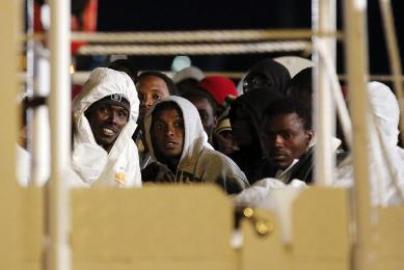Sudan says it is combating illegal migration “on behalf of Europe”
August 30, 2016 (KHARTOUM) – Senior Sudanese security officials have said that Khartoum is carrying the burden of fighting illegal migration on behalf of Europe and pointed to significant difficulties that obstruct efforts to combat human trafficking.

They sent messages urging Europe to appreciate Sudan’s efforts and provide the necessary support to encourage the government continue these efforts, saying that Sudan is not affected by illegal migration because it is considered as a country of transit.
Commander of the Rapid Support Forces (RSF) Mohamed Hamdan Daglo, (aka Hametti), said that Sudan is fighting illegal migration on behalf of Europe, noting the latter should appreciate Khartoum’s efforts.
He alluded that his forces could abandon its sites on the order and the desert and allow illegal migrants to cross to Europe.
“Fighting against [illegal] migration and human trafficking has inflicted on [our forces] heavy loss of life and destroyed [our] vehicles during chasing operations in the Libyan desert, nevertheless, nobody even thanked us [for sacrifices we made]” he said.
Last June, hundreds of RSF elements have been deployed in the remote desert of the Northern State shortly after complaint by the governor of drug and human trafficking by the criminal networks.
Daglo accused Darfur armed movements of engaging in human trafficking, saying the movements transferred their bases to Libya and South Sudan and turned into mercenaries and human traffickers after they were driven out of Darfur.
“The [armed] movements receive foreign support while they are working in human trafficking,” he said.
RSF spokesperson Adam Salih said 25 soldiers from their forces were killed and 315 injured in the fight against illegal migration, adding that 151 cars were destroyed during the vehicular pursuit of human traffickers.
He revealed that the SRF have arrested 808 illegal migrants and 9 human traffickers on the Libyan border during this year.
For his part, director of Passports Department Awad al-Nil Dahia said Sudan has submitted several proposals to the European countries to develop infrastructure on the border in order to control illegal migration, saying that an European Union (EU) team had recently arrived in Sudan and inspected the border on the ground.
He added that the team would return to Sudan in September to follow on the implementation of the EU projects in this regard.
Earlier this year, the EU granted a €100m development package to address the root causes of irregular migration in Sudan. The financial support came after pledge by the Sudanese government to cooperate with Brussels to stop human trafficking to Europe.
The representative of the National Intelligence and Security Services (NISS) Azhari Kamal, for his part, pointed to existence of international human trafficking networks which are connected by highly sophisticated means of communication, saying the NISS captured trafficking gangs holding GPS tracking devices that they use to avoid security sites.
For his part, the Army Ground Forces Chief of Staff of Al-Sir Hassan Bashir said human trafficking networks bring their victims to Sudan via various routes, underscoring that Sudan is capable of controlling its borders and preventing human trafficking.
Sudan is considered as a country of origin and transit for the illegal migration and human trafficking. Thousands of people from Eritrea and Ethiopia are monthly crossing the border into the Sudanese territories on their way to Europe through Libya or Egypt.
In January 2014, the Sudanese parliament approved an anti-human trafficking law which punishes those involved with human trafficking with up to 20 years imprisonment.
(ST)
